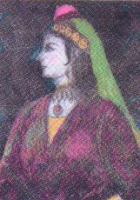Habba Khatoon
Habba Khatoon Poems
I left my home for play
Nor yet again
Returned, although the day
Sank in the West.
...
My friend, this youth is loss
I lost all day on the way
...
Which rival of mine has lured you away from me?
Why are you cross with me?
Forget the anger and the sulkiness,
You are my only love,
...
The one who dazzles - have you seen that one?
Upon him look!
A sleepless stream in search of him I run,
A restless brook.
...
Which rival of mine has lured you away from me?
Why are you cross with me?
Forget the anger and the sulkiness,
You are my only love,
...
The world its Ramadan will end,
The lover's Id,
The feast of love, O call him, friend!
For love is Id.
...
Meadows I cover with flowers for you,
Come, my lover of flowers!
Come, let me gather fresh jasmine for you,
Never return these hours!
...
In henna I have dyed my hands,
When will he come?
I die, while he roams distant lands,
My heart is numb!
...
Rain has come, and fields and fruit trees sing,
Spring has come, and Love, the Lord of Spring,
Dandelions have lifted up their faces,
...
Wild, the vagrant yellow rose
Again has bloomed,
Beauty has in all that grows
Rare forms assumed!
...
Habba Khatoon Biography
Habba Khatun was a 16th century Muslim poet from the village of Chandrahar of Kashmir. She was born in the small village Chandrahar, and was known under the name Zoon (the Moon) because of her immense beauty until her marriage with Yusuf Shah Chak, who later became ruler of Kashmir, after which she was called Habba Khatun. Her songs are popular in Kashmir and she is almost a legendary figure in Kashmiri literary history. Perhaps the influence she has exerted over the popular imagination had much to do with the difficult life she had as a peasant girl who had received some basic education. Habba Khatoon was a peasant girl who, after a difficult first marriage which ended in divorce, married Kashmir's last independent King, Yousuf Shah Chak. When the Mughal King Akbar conquered Kashmir and exiled Yousuf Shah Chak, Habba Khatoon spent the rest of her life wandering across the Valley singing her songs. Even though there is some dispute about biography, the texts associated with her name are widely popular across Kashmir. She grew up in the midst of the saffron fields and in the shade of the chinar trees. She was not raised as a typical peasant girl. She had learnt how to read and write from the village moulvi. At an early age her father married her to a peasant boy. But this illiterate peasant boy could not keep Zoon happy. He could not understand the longings of her heart. Just like Lal Ded, Zoon also was sad. Lalla became desperate and left her home. Zoon divorced her husband and started singing songs in Kashmiri. Zoon used to sing in the shade of a chinar tree. One day Yusuph Shah Chak was out hunting that way on horseback. He happened to pass the place where Zoon was singing under the chinar tree. He heard her melancholic melodies, and went to look at her. He was stunned by her beauty. As soon as their eyes met, they fell in love. Later, Zoon and Yusuph Shah were married. She changed her name and became Habba Khatun. Habba Khatun introduced lol to Kashmiri poetry, lol is more or less equivalent to the English 'lyric'. It conveys one brief thought. It is full of melody and love. Habba Khatun kept Yusuph Shah under her control. The couple was very contented, and Yusuph Shah became the ruler of Kashmir. Their happiness did not last long. Akbar came into prominence in Delhi, and he called Yusuph Shah there. In 1579, Yusuph Shah was compelled to go to Delhi. In Delhi, Akbar arrested him. He was kept in prison in Bihar. Poor Habba Khatun was separated from Yusuph Shah. The songs of Habba Khatun are full of the sorrow of separation. It is claimed that Habba Khatun introduced the 1ol into tho Kashmiri (language) After her came Arnimal who also sang mournful lyrics. Habba Khatoon spent her last days singing her songs in the Valley, songs which are popular to this day. Even now you can see young Kashmiri singers turn to such popular lyrics as Mye ha kaer chey kit and Che Kamiu Sonei Myani.)
The Best Poem Of Habba Khatoon
Habba Khatoon
I left my home for play
Nor yet again
Returned, although the day
Sank in the West.
The name I made is hailed
On lips of men,
Habba Khatun! though veiled,
I found no rest.
Through crowds I found my way,
From forests, then,
The sages came, when day
Sank in the West.
[Translated by Nilla Cram Cook]
